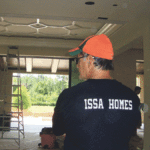How would you teach: Give me the red cup.
That simple statement has inspired and motivated me for almost two decades. It has enriched my personal development and has inspired my professional life. That simple question began a pilot Applied Behavior Analysis program designed by the Center for Autism and Related Disabilities at Kennedy-Krieger Institute.

Let’s consider the incremental steps required to teach:
Give me the red cup.
1. CUP – Can the person identify the object – cup?
Communication requires a mutual system of symbols. We need mutual understanding of the object/subject about which we are communicating.
2. RED – Can the person identify and discriminate – red?
Categorizing, as in color, is a systematic way to organize information. It provides clarity and distinction.
3. GIVE – Can the person understand the request – give?
Teaching give begins with an open hand to prompt the response.
That open hand invites sharing.
4. ME – Can the person identify the me and the not me?
When I am aware of the not me as separate from me, it is the beginning of relationship. I must understand each of us as separate before I seek to relate.
Give me the red cup becomes a declaration of autonomy and relationship. Learning occurs and relationship begins.
These incremental steps began my experience of 20,000 hours in the field of autism and behavior. Those hours have been joyful, challenging and rewarding.
They have inspired me to attend to my intentions, which must strive for mutual understanding in communication. They must provide clarity and distinction. They invite participation. They honor the Other. Attending to these intentions creates and sustains meaningful relationship.
Those 20,000 hours also afforded me insight to and observation of the deep needs of parents and families to feel competent and understood.
Over the years, individuals and families have invited me to journey with them. It has been humbling and fulfilling. Together, we build rapport. We identify a point where an incremental step will provide meaningful change and improved quality of life. One step at a time. And then we take the next step.
Make no mistake, the journey might take time, it might be challenging. Parents and families seek support and consultation precisely because they have journeyed long and feel challenged. With incremental steps and a positive approach, change occurs.
Many families report feeling less overwhelmed and more successful. Fathers have cried with gratitude. Mothers have declared a greater sense of rapport and relationship. All present have a greater sense of understanding and increased feeling of competence. I welcome the opportunity to journey with you.


